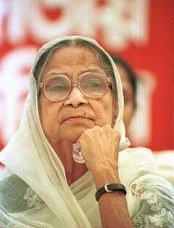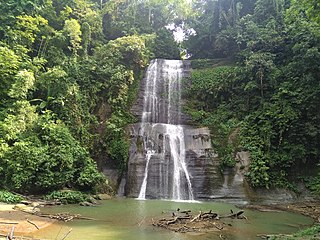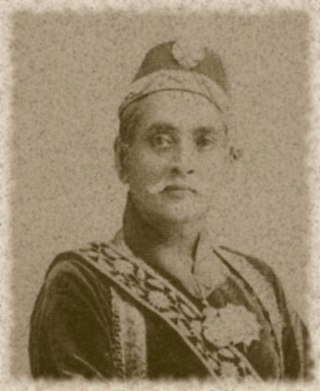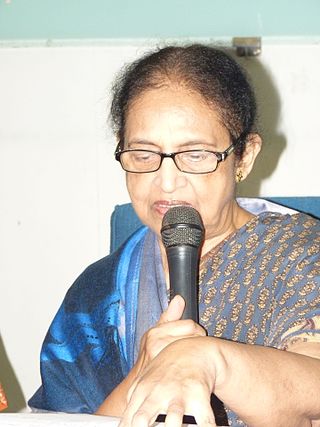Related Research Articles

Sir Khawaja Nazimuddin was a Pakistani politician and statesman who served as the second governor-general of Pakistan from 1948 to 1951, and later as the second prime minister of Pakistan from 1951 to 1953.

Begum Sufia Kamal was a Bangladeshi poet, feminist leader, and political activist. She took part in the Bengali nationalist movement of the 1950s and civil society leader in independent Bangladesh. She led feminist activism and was a president of Bangladesh Mahila Parishad. She died in 1999 and was the first woman to be given a state funeral in Bangladesh.

Moulvibazar, also spelled Moulabhibazar,Maulvibazar, Moulavibazar, and Maulavibazar, is the southeastern district of Sylhet Division in northeastern Bangladesh, named after the town of Moulvibazar. It is bordered by the Indian states of Tripura and Assam to the south and east, respectively; by the Bangladeshi districts of Habiganj to the west and Sylhet to the north.

Scholastica is a private English medium school in Dhaka, Bangladesh, offering pre-school to A level courses. It was founded in 1977 by businesswoman and former advisor to the government, Yasmeen Murshed. The school follows the Cambridge International Curriculum set by the Cambridge Assessment International Education for Grade 9 to 12 and offers the GCE O Level, GCE AS Level and the GCE A Level qualifications. It is prominently recognised as one of the elite schools of Bangladesh, boasting a strong alumni network.

Shahbagh is a major neighbourhood and a police precinct or thana in Dhaka, the capital and largest city of Bangladesh. It is also a major public transport hub. It is a junction between two contrasting sections of the city—Old Dhaka and New Dhaka—which lie, respectively, to its south and north. Developed in the 17th century during Mughal rule in Bengal, when Old Dhaka was the provincial capital and a centre of the flourishing muslin industry, it came to neglect and decay in early 19th century. In the mid-19th century, the Shahbagh area was developed as New Dhaka became a provincial centre of the British Raj, ending a century of decline brought on by the passing of Mughal rule.

Nawab Bahadur Sir Khwaja Ahsanullah KCIE was the third Nawab of Dhaka. He was notable for his philanthropic works in Bengal, most notably his donations to the present Bangladesh University of Engineering and Technology. He also authored books in Persian and Urdu under the pen name of Shaheen. The palace Ahsan Manzil is named after him by his father Khwaja Abdul Ghani.

Nawab Sir Khwaja Salimullah Bahadur was the fourth Nawab of Dhaka and one of the leading Muslim politicians during the British rule in India.

The Nawab of Dhaka, originally spelt in English Nawab of Dacca, was the title of the head of one of the largest Muslim zamindar in British Bengal and Assam, based in present-day Dhaka, Bangladesh. The title of nawab, similar to the British peerage, was conferred upon the head of the family by Queen Victoria as a recognition of the first Nawab's loyalty and contribution to the social welfare activities.
Khawaja Shahabuddin was a politician of Kashmiri-Bengali descent from East Pakistan who was a minister in the Government of Pakistan and member of the Dhaka Nawab family. He was the younger brother of Khawaja Nazimuddin and the father of Bangladeshi Lieutenant-General Khwaja Wasiuddin.
Bengalis in Pakistan are ethnic Bengali people who had lived in either West Pakistan or East Pakistan prior to 1971 or live in present-day Pakistan. Most Pakistani Bengalis, are bilingual speaking both Urdu and Bengali and are mainly settled in Karachi. Bengalis that arrived in Pakistan before 1971 have now assimilated with the Urdu-speaking people in Karachi.

Feminism in Bangladesh seeks equal rights of women in Bangladesh through social and political change. Article 28 of Bangladesh constitution states that "Women shall have equal rights with men in all spheres of the State and of public life".
Syed Khwaja Khairuddin was a Pakistani politician. He was the vice mayor of Dhaka and was known for having opposed the Independence of Bangladesh. Following the country's liberation, he migrated to live in Pakistan.

Khwaja Wasiuddin was an army general and diplomat. He started his career as a young officer in the British Indian Army and later became a senior general in Pakistan Army. He was the permanent representative of Bangladesh to the United Nations.
Syed Mahbub Murshed was a Bangladeshi lawyer and jurist. He served as the Chief Justice of East Pakistan High Court during 1964–1967.

Najma Chowdhury was a Bangladeshi academic.
Farhat Banu was a Member of the Dhaka Nawab family and member of the Bengal Legislative Assembly in British India. Her uncle was the Nawab of Dhaka, Sir Khwaja Salimullah.
Hasina Murshed was a Bengali politician, educationist, and Member of the Bengal Legislative Assembly.
Khwaja Zakiuddin (1918–2003) was a Bengali aristocrat and Pakistani statesman. He was a member of the Dhaka Nawab family.

Dhakaiya Urdu, sometimes unofficially and mythically concocted referred to as Sobbasi Language or Khosbasi Language, is a distinct Bengalinized dialect of Urdu that is native to Old Dhaka beside Dhakaiya Kutti a dialect of Bangla, in Dhaka, Bangladesh. It is being spoken by the city's Sobbas community, Khusbas community, Nawab Family, other native communities such as Shia community and aristocratic families. Sobbasi / Khosbasi is not the name of any language but the adjective and identifies some communities as referred by Hakim Habibur Rahman in Dhaka Pachas Baras Pahle. The usage of this language is gradually declining due to negative perceptions following it being forced upon the people of erstwhile East Bengal. However, at present, with the patronage and sole efforts of the cultural and social activists of the Dhakaiya Urdu language group, Dhakaiya Urdu is rapidly blossoming and expanding again.Today, Dhakaiya Urdu is one of the two dialects of Urdu spoken in Bangladesh; the other one being the Urdu spoken by the Biharis and Stranded Pakistanis in Bangladesh.
References
- ↑ Murshed, Yasmeen (27 June 2004). "The Humayun Nama: Gulbadan Begum's forgotten chronicle". The Daily Star. Retrieved 19 September 2016.
- ↑ "Outlets of Coffee World, Books Express inaugurated". The Daily Star. 27 March 2007. Retrieved 19 September 2016.
- 1 2 3 "Yasmeen Murshed appointed high commissioner to Pakistan". bdnews24.com. Retrieved 19 September 2016.
- 1 2 "Terror question confronts Dhaka school". The Telegraph. Calcutta. Archived from the original on 11 July 2016. Retrieved 19 September 2016.
- ↑ "Much Ado About Nothing staged at Scholastica". The Daily Star. 21 November 2015. Retrieved 19 September 2016.
- ↑ "Yasmeen Murshed made envoy to Pakistan". The Daily Star. 26 November 2007. Retrieved 19 September 2016.
- ↑ "Yasmeen Murshed". nawabbari.com. Nawab Bari. Retrieved 30 November 2017.